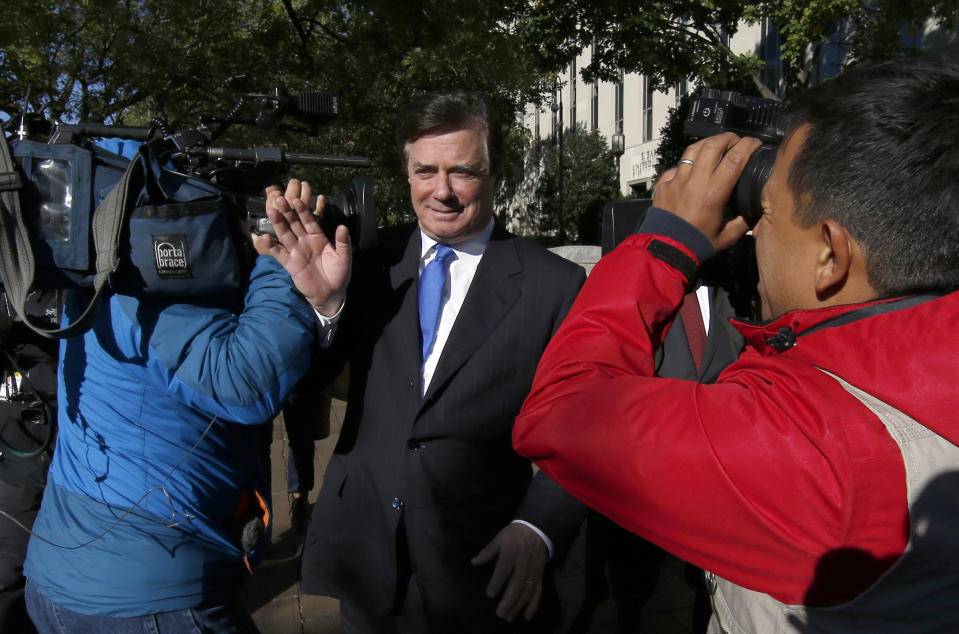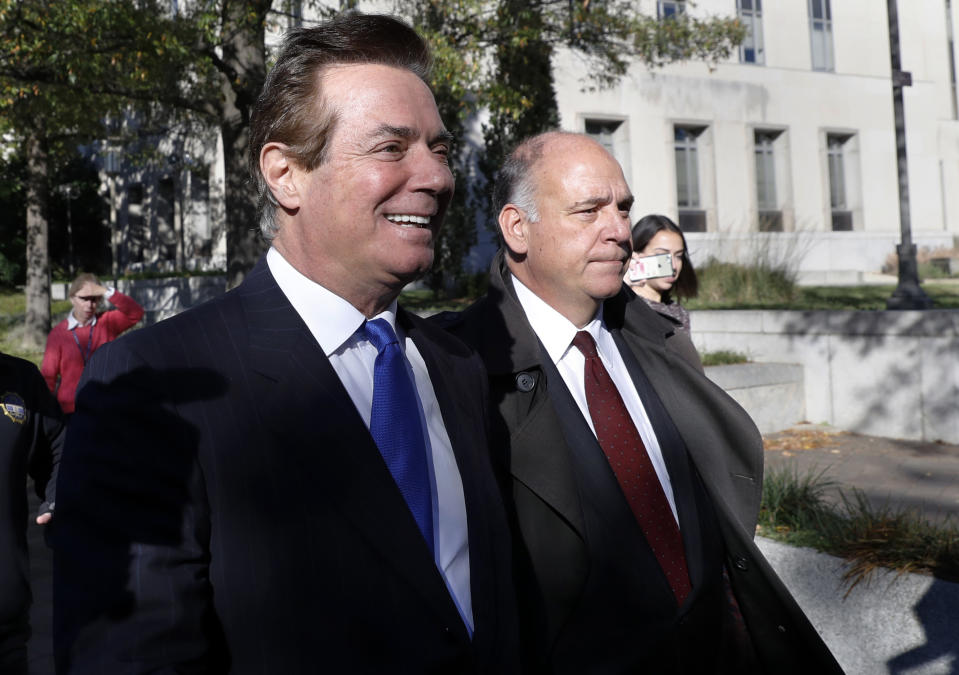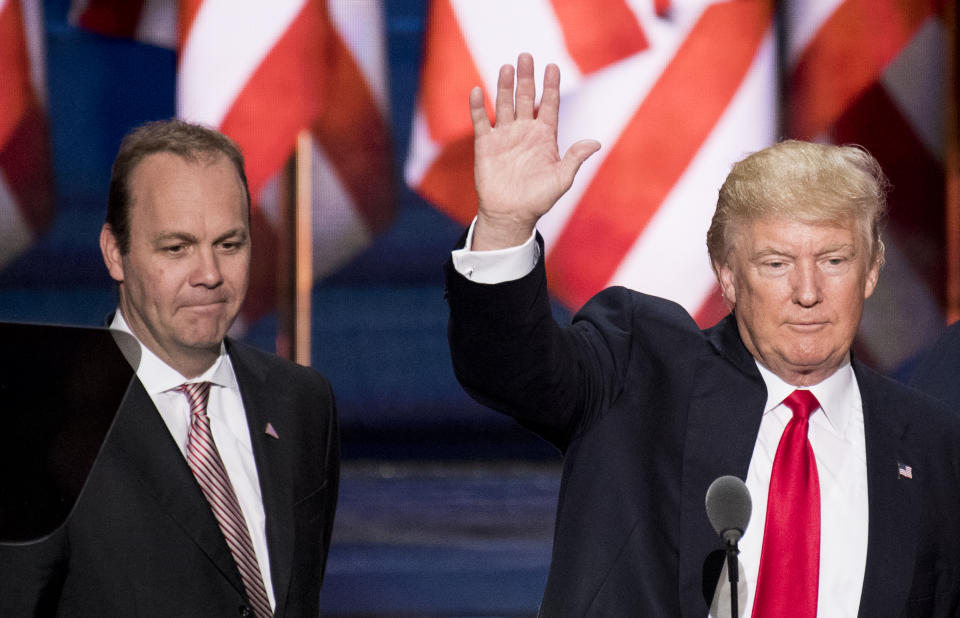Collusion or conspiracy? Understanding the charges against Manafort and Gates

Special counsel Robert Mueller unveiled the first charges in the Russia probe against members of President Trump’s inner circle — and more are likely coming. There were 12 counts in the indictments handed up by a federal grand jury against Paul Manafort, President Trump’s former campaign chairman, and Rick Gates, Manafort’s former business partner, including conspiracy to launder money and failure to file reports of foreign bank and financial accounts. But perhaps the most sinister-sounding is count one: conspiracy against the United States.
Trump has repeatedly denied that his campaign colluded with Russia, and this charge does not allege that he did. Conspiracy and collusion may be synonyms in colloquial conversation, but they mean different things legally.
Collusion vs. conspiracy
The term “collusion” is widely used in the present context to refer to alleged coordination between members of the Trump campaign and Russian agents to affect the 2016 presidential election, but it has no legal definition and is not necessarily criminal (with the exception of violating antitrust laws: companies fixing prices to manipulate markets).
Sam Pillsbury, a professor of law at Loyola Law School in Los Angeles, put it simply: Conspiracy is a federal crime; collusion is not.
“Collusion describes the larger wrong that has been alleged against the Trump campaign, encompassing both political wrongdoing — basically disloyalty to the U.S. — and a variety of criminal and civil law violations that may have been committed as part of the collusion,” Pillsbury told Yahoo News. But the specific charge is conspiracy, which is a crime under the common law, the criminal codes of all states and the federal law, according to David Gray, a professor of law at the University of Maryland. Count one alleges that Manafort and Gates conspired against the United States, and took specific steps to further their scheme.
“Given the nature and scope of the alleged conspiracy, that could amount to scores of individual acts of financial malfeasance,” Gray told Yahoo News.
According to Pillsbury, conspiracy allegations give prosecutors wide scope for proving criminal liability and broad latitude in the type of evidence they can present.

Classic organizational investigation
John Cohen, the former acting undersecretary for intelligence at the Department of Homeland Security, has worked on cases similar to the Russia probe over more than three decades in law enforcement and homeland security. He said Mueller’s team appears to be involved in a classic organizational investigation, similar to a RICO (Racketeer Influenced and Corrupt Organizations Act) case or a CCE (continuing criminal enterprise) case.
The goal of these investigations is to determine whether a group of people engaged in activities that constitute a crime. In this case, it would be Russian interference with our election and whether people in the U.S. were engaged in a criminal conspiracy to achieve this objective.
A variety of charges can arise from these investigations, Cohen told Yahoo News.
Cohen, now a professor of professional practice in criminal justice at Rutgers University, said that during organizational investigations, his teams would map out criminal organizations and determine the first suspects they would like to go after.
“In some cases, we’d go after people we thought would flip and cooperate with us to get us more information,” Cohen said. “In other cases, we would identify people and arrest them on some charge because we felt it would so disrupt the other organization that it would provide opportunities to gain additional information and intelligence.”
He said that participants in a continuing criminal enterprise could be prosecuted for “a whole series of offenses.”
Such charges could include money laundering, tax evasion or wire fraud. Mueller’s team may or may not wrap all these charges together with an overall prosecution under the RICO statute or under a CCE — alleging that all the different criminal offenses were part of an ongoing, illicit relationship that included activities to disrupt, interfere with or manipulate the results of the 2016 presidential election.

Possible charges connected to collusion
Stuart Green, a professor of law at Rutgers Law School, said opening charges are often referred to as low-hanging fruit, and it’s often easier to prosecute someone for covering up criminal wrongdoing than it is to prove the underlying wrongdoing — as demonstrated by decades of white-collar criminal prosecutions.
Green said there is no crime as such in politicians digging up dirt on their opponents — even with the help of a foreign government — but depending on how it was carried out, there could be criminal liability.
So what possible allegations of wrongdoing might Mueller be investigating?
Green said there are three plausible charges connected with collusion that could come about from the Russia probe: helping with the hacking of the DNC, exchanging “things of value” with Moscow and receiving stolen property.
“If the Trump campaign assisted in or coordinated the dissemination of the emails stolen from the DNC or John Podesta, that could constitute a violation of the Computer Fraud and Abuse Act,” Green said. “They’d be charged with aiding and abetting in the hacking of the DNC computers.”
We know that the DNC hack happened, but the question is how much the Trump campaign knew about it and whether it was complicit in it. Were the Russians acting on their own? How much was the Trump campaign involved?
Green said campaign finance laws could apply if the Trump campaign and Moscow exchanged the DNC emails, and that these constitute what the statute refers to as a “thing of value.” The campaign could instead be charged with receiving stolen property. Either of these would represent a somewhat novel application of those statutes.
Green emphasized that as these cases proceed, it’s often easier to prosecute cover-ups than wrongdoing. If someone on the Trump campaign lied to government investigators, it could give rise to a false statements charge.
“It’s lying to the government affirmatively, but also failing to provide information that is required,” Green said. “Those are relatively straightforward charges to prove. It depends on what’s been said during interviews. You don’t need to be under oath to be prosecuted for false statements. Lying to an FBI agent or federal investigator could constitute a false statement.”

Intelligence community findings
The intelligence community concluded that the Russians were involved in an extensive and sophisticated influence and propaganda campaign in which they sought to achieve multiple goals: sow discord within the United States, interfere with the election and undermine confidence in the government. Although Russia and its predecessor, the U.S.S.R., have conducted these operations against the U.S. for decades, this time they were able to use social media and other means to influence far more people.
It is public knowledge that Manafort and others in the Trump campaign had long-standing relationships with individuals or entities associated with the Russian government.
The indictment alleges that Manafort was involved in a multiyear relationship with ousted pro-Russian Ukrainian President Viktor Yanukovych and that — through this business relationship — he received and concealed millions of dollars. He stands accused of laundering the money through offshore accounts and failing to register as a foreign agent.
Historical documents
The controversial Trump–Russia dossier, which was written by former British intelligence officer Christopher Steele, refers to Russian President Vladimir Putin and Yanukovych worrying that payments to Manafort were not concealed adequately and could come to light, creating a trail to Russian operations.
The similarity of language in the Steele dossier and the indictment struck Cohen as an indication that the investigation is looking at the actions of these individuals as they relate to Russia going back much further than the 2016 election — and that the indictment likely doesn’t contain all that Mueller knows about possible collusion, or even Manafort and Gates in particular.
“At this stage in an investigation, an indictment of an individual who is just one part of a potential criminal enterprise is not going to contain everything that the government knows,” Cohen said. “It will only contain enough information to successfully file the charges you want to file.”
That the current indictment does not include crimes explicitly linked to collusion does not mean such charges are not forthcoming, he said. It is still too early to tell.
“So to come out and say, ‘This didn’t mention collusion in the American election’ — that’s not really at this stage a valid point to make. Though it may be technically accurate, it doesn’t necessarily fully represent how those activities fit into the bigger picture,” Cohen said.

Mueller’s opening salvo
The allegations in the indictment are significant, covering Manafort and Gates’s relationships with individuals and entities associated with the Russian government as well as accused illegal activities intended to hide payments that came from those relationships and conceal the relationships from the U.S. government.
Conspiracy against the United States, Green explained, is a serious charge but might not be as serious as it sounds to a layperson. He said it does not mean conspiring to overthrow the government or conspiring to aid the enemies of the government. Rather, it means a conspiracy that violates or undermines federal law. The victims could even be private citizens or federally insured banks.
“It doesn’t have anything to do directly with treason or conspiring against the U.S. in a common-sense understanding. It’s more of a term of art,” Green told Yahoo News. “The United States [in this instance] just means Congress and the federal courts have jurisdiction over the case because it involves a federal crime or the United States government.”
He said conspiracy to defraud the United States involves impeding the operations of the U.S. government even if it doesn’t constitute a specific crime against the U.S.
“Typically, courts allow both provisions to be charged in the same indictment based on the same conduct, so they are not mutually exclusive,” Green said.
Where did the rest of the money go?
David M. Shapiro, a professor at John Jay College of Criminal Justice and a former FBI special agent who worked in counterintelligence against the Soviet Union, said that if you look past the formal legalese, a clear picture emerges of the allegations: There was an awful lot of money coming from officials in Ukraine allied with Russia and seeking to influence policy in the United States that was going to lobbyists who failed to disclose who was paying them.
As an expert in forensic accounting, Shapiro said what he found most interesting about the indictment of Manafort and Gates was the absence of detail about the disposition of the $75 million that allegedly passed through the company run by the two men. The indictment specifies that $18 million went to Manafort and $3 million went to Gates — leaving $54 million unaccounted for.
“I have two main questions,” Shapiro told Yahoo News. “One, who and what were the sources for the $75 million going in and, two, where did the $54 million going out that’s not accounted for go? We’re seeing basically commissions paid to Manafort and Gates, but clearly there’s a lot more going on. There’s a lot of money out there that’s unexplained.”
United States Legal Code
The Justice Department says that courts have defined defrauding the government as activities that affect the government in at least one of three ways: They cheat the government out of money or property, obstruct or interfere with legitimate government activity or make wrongful use of a “governmental instrumentality.”
The general conspiracy statute (18 U.S.C. § 371) outlines what would constitute conspiracy to commit offense or to defraud United States:
“If two or more persons conspire either to commit any offense against the United States, or to defraud the United States, or any agency thereof in any manner or for any purpose, and one or more of such persons do any act to effect the object of the conspiracy, each shall be fined under this title or imprisoned not more than five years, or both.
If, however, the offense, the commission of which is the object of the conspiracy, is a misdemeanor only, the punishment for such conspiracy shall not exceed the maximum punishment provided for such misdemeanor.”
Read more from Yahoo News:


